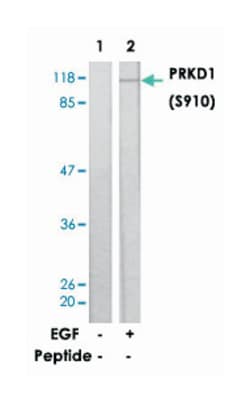Learn More
PRKD3 (phospho S910), Rabbit anti-Human, Mouse, Rat, Polyclonal Antibody, Abnova™
Shop All Abnova Corporation ProductsDescription
Members of the protein kinase C (PKC) family function in many extracellular receptor-mediated signal transduction pathways. See PRKCA (MIM 176960) for further background information. The PRKCM gene encodes a cytosolic serine-threonine kinase that binds to the trans-Golgi network and regulates the fission of transport carriers specifically destined to the cell surface.[supplied by OMIM
Specifications
Specifications
| Antigen | PRKD3 |
| Applications | Western Blot |
| Classification | Polyclonal |
| Concentration | 1 mg/mL |
| Conjugate | Unconjugated |
| Description | Rabbit polyclonal antibody raised against synthetic phosphopeptide of PRKD3. |
| Dilution | Western Blot (1:500-1:1000) The optimal working dilution should be determined by the end user. |
| Formulation | In PBS (without Mg2+ and Ca2+), 150mM NaCl, pH 7.4 (50% glycerol, 0.02% sodium azide) |
| Gene | PRKD1 |
| Gene Alias | PKC-MU/PKCM/PKD/PRKCM |
| Show More |
For Research Use Only
By clicking Submit, you acknowledge that you may be contacted by Fisher Scientific in regards to the feedback you have provided in this form. We will not share your information for any other purposes. All contact information provided shall also be maintained in accordance with our Privacy Policy.


